| کد مقاله | کد نشریه | سال انتشار | مقاله انگلیسی | نسخه تمام متن |
|---|---|---|---|---|
| 7333477 | 1476042 | 2015 | 10 صفحه PDF | دانلود رایگان |
عنوان انگلیسی مقاله ISI
Inequalities in social capital and health between people with and without disabilities
ترجمه فارسی عنوان
نابرابری در سرمایه اجتماعی و سلامت بین افراد دارای معلولیت و بدون آن
دانلود مقاله + سفارش ترجمه
دانلود مقاله ISI انگلیسی
رایگان برای ایرانیان
کلمات کلیدی
ABSDSPOECDGSSAustralian Bureau of Statistics - اداره آمار استرالیاOrganisation for Economic Co-operation and Development - سازمان همکاری اقتصادی و توسعهSocial capital - سرمایه اجتماعیSelf-rated health - سلامتی خود ارزیابیDisability - معلولیتHealth inequalities - نابرابری های بهداشت و سلامتGeneral social survey - نظرسنجی اجتماعی عمومیImpairment - نقص
ترجمه چکیده
سلامت ذهنی و فیزیکی افراد معلول به خوبی ثبت شده است و شواهدی وجود دارد که نشان می دهد نابرابری در سلامت بین افراد دارای معلولیت و یا بدون آن ممکن است تا حدی به علت کمبود های اجتماعی و اقتصادی (به عنوان مثال آموزش کم، بیکاری) با معلولیت اگر چه مطالعات کمتری در زمینه نابرابری در سرمایه اجتماعی وجود دارد، شواهد نشان می دهد که افراد دارای معلولیت نیز در این زمینه محروم هستند. ما بر مفهوم سازی سرمایه اجتماعی به عنوان منابعی که به افراد از عضویت آنها در شبکه های اجتماعی منتهی می شود، متمرکز شده ایم. با استفاده از داده های عمومی اجتماعی بررسی 2010 از 1528 بزرگسالان زندگی می کنند که در خانه های خصوصی در مناطق غیر از دورافتاده استرالیا هستند، ما سرمایه اجتماعی را در سه حوزه: شبکه های غیر رسمی (تماس با خانواده و دوستان) اندازه گیری کردیم. شبکه های رسمی (عضویت گروهی و مخاطبین در سازمان های تاثیرگذار) و حمایت اجتماعی (مالی، عملی و عاطفی). ما مقادیر سرمایه اجتماعی و سلامت خود را برای افراد دارای معلولیت و افراد مبتلا به انواع مختلف اختلالات (حسی و گفتاری، فیزیکی، روان شناختی و فکری) مقایسه کردیم. علاوه بر این، ما بررسی کردیم که تفاوت در سطوح سرمایه اجتماعی به نابرابری در سلامت بین افراد دارای معلولیت و بدون معلول کمک می کند. ما دریافتیم که افراد دارای معلولیت نسبت به افراد دارای معلولیت در رابطه با شبکه های غیر رسمی و رسمی، حمایت اجتماعی و وضعیت سلامتی خود ارزیابی شده اند و نابرابری برای افراد مبتلا به اختلالات روحی و روانی بیشتر است. تفاوت در سرمایه اجتماعی ارتباط بین ناتوانی و سلامت را توضیح نداد. این یافته ها اهمیت توسعه سیاست های اجتماعی را تقویت می کند که بر اساس نیازهای مختلف افراد مبتلا به انواع اختلالات مختلف، افراد دارای معلولیت را ترویج می دهند. با توجه به محیط پیرامون سیاست، نظارت مداوم بر شرایط زندگی افراد معلول، از جمله تقسیم اطلاعات از نوع اختلال، بسیار مهم است.
موضوعات مرتبط
علوم پزشکی و سلامت
پزشکی و دندانپزشکی
سیاست های بهداشت و سلامت عمومی
چکیده انگلیسی
The poor mental and physical health of people with disabilities has been well documented and there is evidence to suggest that inequalities in health between people with and without disabilities may be at least partly explained by the socioeconomic disadvantage (e.g. low education, unemployment) experienced by people with disabilities. Although there are fewer studies documenting inequalities in social capital, the evidence suggests that people with disabilities are also disadvantaged in this regard. We drew on Bourdieu's conceptualisation of social capital as the resources that flow to individuals from their membership of social networks. Using data from the General Social Survey 2010 of 15,028 adults living in private dwellings across non-remote areas of Australia, we measured social capital across three domains: informal networks (contact with family and friends); formal networks (group membership and contacts in influential organisations) and social support (financial, practical and emotional). We compared levels of social capital and self-rated health for people with and without disabilities and for people with different types of impairments (sensory and speech, physical, psychological and intellectual). Further, we assessed whether differences in levels of social capital contributed to inequalities in health between people with and without disabilities. We found that people with disabilities were worse off than people without disabilities in regard to informal and formal networks, social support and self-rated health status, and that inequalities were greatest for people with intellectual and psychological impairments. Differences in social capital did not explain the association between disability and health. These findings underscore the importance of developing social policies which promote the inclusion of people with disabilities, according to the varying needs of people with different impairments types. Given the changing policy environment, ongoing monitoring of the living circumstances of people with disabilities, including disaggregation of data by impairment type, is critical.
ناشر
Database: Elsevier - ScienceDirect (ساینس دایرکت)
Journal: Social Science & Medicine - Volume 126, February 2015, Pages 26-35
Journal: Social Science & Medicine - Volume 126, February 2015, Pages 26-35
نویسندگان
Johanna Mithen, Zoe Aitken, Anna Ziersch, Anne M. Kavanagh,
